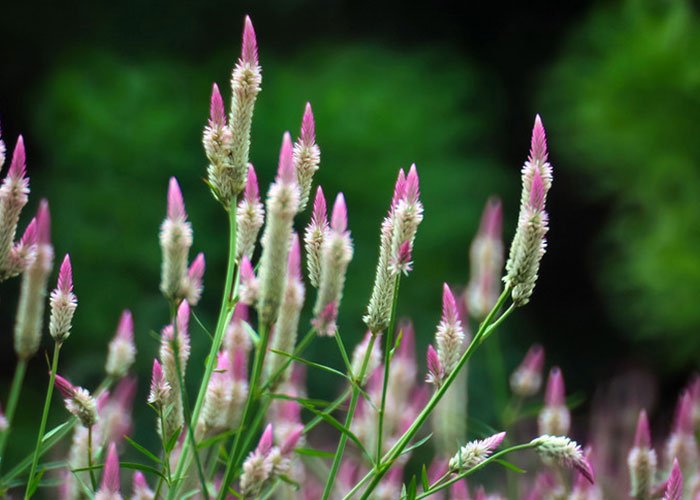What Is Qing Xiang Zi
Qing Xiang Zi also known as Celosia Seed or Semen Celosiae is the mature seed of Celosia argentea, which is an annual herb belonging to the family Amaranthaceae. It first appeared in <Shennong Ben Cao Jing> in the late Western Han Dynasty (around 100 BCE).
Celosia argentea is commonly known as the plumed cockscomb or silver cock’s comb and is a common weed. They often grow on plains, fields, hills, and mountain slopes below 1500 meters above sea level. They are distributed in China, North Korea, Japan, Russia, India, Vietnam, Myanmar, Thailand, Philippines, Malaysia, and tropical Africa.
Every autumn, when the fruits of Celosia argentea are mature, people gather their ears, dry them in the sun, pat them, take out their seeds, and make them into Chinese herbal medicines.

Qing Xiang Zi contains sessilistemonine, ancistrocladine, cyclic peptides, Celosin A-G, β-sitosterol, palmitic acid, stigmasterol, daucosterol, oleanolic acid, fatty oil, polysaccharides, nitric acid Potassium, and niacin.
Generally, the black or red-black and oblate Qing Xiang Zi with thin seed skin is preferred.
According to the Chinese Pharmacopoeia, the medicinal nature of Qing Xiang Zi is slightly cold, with a bitter taste. It has a certain therapeutic effect on the pathological changes of the liver and spleen meridians.
In traditional Chinese medicine, it is often used to clear heat and reduce fire, improve eyesight, eliminate nebula, and treat senile cataract, fever, diarrhea, oral ulcer, itching, jaundice, gonorrhea, redness and swelling of the eyes, photophobia, blurred vision, headache and dizziness caused by flaming-up of liver-fire or wind-heat evil accumulated in the liver channel.
Benefits
- Inhibiting liver damage induced by CCL4 or D-galactosamine and protecting the liver.
- Reducing epithelial cell apoptosis induced by oxidative damage, delaying and treating cataracts.
- Its polysaccharides can promote insulin secretion and lower blood sugar.
- Its total saponins can reduce the levels of cholesterol (TC) and triacylglycerol (TG) in the serum.
- Purging liver-fire, treating redness and swelling of the eyes, nebula, blurred vision caused by flaming-up of liver-fire.
- Improving vision and treating blurred vision caused by blood heat and liver deficiency.
- Treating dizziness and dry eyes caused by liver-kidney deficiency.
- Stabilizing liver Yang and alleviating vertigo, headache, and insomnia caused by fire syndromes caused by hyperactivity of the liver-yang.
- Inhibiting the proliferation of human glioma cells SHG44, human intestinal cancer cells HCT116, human leukemia cells CEM, human liver cancer cells HepG2, human breast cancer cells MDA-MB-435, human gastric cancer cells SGC-7901, human liver cancer cells BEL-7404.
- Inhibiting Bacillus cereus, Candida albicans, Pseudomonas aeruginosa, Shigella, Staphylococcus aureus, Escherichia coli.
- Enhancing the expression of autophagy-specific proteins LC3 and beclin1, increasing the level of autophagy, promoting the process of autophagy, reducing the incidence of the relative area of aortic plaque, and preventing atherosclerosis.
- Studies have found that it can inhibit the activity of α-amylase and α-glucosidase in vitro. It may help reduce blood sugar levels after meals.
Combinations
- It can be used in combination with Jue Ming Zi (Cassia Seed), Chong Wei Zi (Fructus Leonuri), Ling Yang Jiao (Cornu Antelopis), etc. to treat redness and swelling of the eyes, nebula, blurred vision caused by flaming-up of liver-fire.
- It can be used in combination with Sheng Di Huang (Radix Rehmanniae), Xuan Shen (Radix Scrophulariae), Che Qian Zi (Semen Plantaginis), etc. to treat blurred vision caused by blood heat and liver deficiency.
- It can be used in combination with Tu Si Zi (Semen Cuscutae), Rou Cong Rong (Cistanche), Shan Yao (Rhizoma Dioscoreae), etc. to treat dizziness and dry eyes caused by liver-kidney deficiency.
- It can be used in combination with Shi Jue Ming (Concha Haliotidis), Zhi Zi (Fructus Gardeniae), Xia Ku Cao (Spica Prunellae), etc. to alleviate vertigo, headache, and insomnia caused by fire-syndromes caused by hyperactivity of the liver-yang.
Side Effects
At present, there are no reports in the literature that it has toxic effects.
Individual patients taking it may cause blurred vision.
If you need to take it for a long time, be sure to consult your doctor.
Precautions and Warnings
- The dosage of Qing Xiang Zi should be controlled between 10-15g.
- It can be made into decoctions or pills.
- People who are allergic to Qing Xiang Zi should not take it.
- Patients with glaucoma or dilated pupils should not take it.
